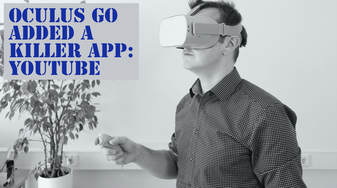|
A couple of months ago, I wrote a blog post right after I got the Oculus Go, and I concluded that it was just not fully ready for schools yet. For those that read that post or know what the Go is, bear with me. I want to dive back into what the Go is and why I concluded, but I also want to tell you why that view is changing.
To start, the go is virtual reality. It's a fully immersive environment as opposed to augmented which is digital images overlaid on to the real world. The Go is the first attempt to hit what many thought was a sweet spot. It's not the overly expensive headset that the Oculus Rift and HTC Vive are, but it is also a standalone headset unlike many of the smaller virtual reality designs which require to use a phone and a viewer. From that standpoint, it has a whole lot of benefits for the classroom. It was the content that I came down on as being lacking in my first impressions post. The content was just not there for schools. To get content for the Go, you need to go through the go store, and understandably it's best selling apps are mostly games. Unfortunately, there is just not educational value in those. From an education standpoint, there are tons of experiences in the store, but most of them are standalone experiences that are going to require you to download that one app just to do that one thing. This includes explorations of space, natural parks, and other areas around the world. It's the biggest issue is that Google wasn't on board, and that has been the best place to go for these fuller experiences for a while. Realistically, in schools we want VR to explore some concept that is real. It could be a real place, or it could be a model of a place we can't get to (like inside the human body), but for it has to have an educational value of learning something that will benefit the person in the real world. Google naturally has an advantage in that space because they have both millions of people feeding data to them and they have the scope to do things like street view and earth. Others don't, and that's why Oculus has to have them as a partner for Oculus Edu. That partnership is incredibly hard though because Oculus is Facebook. It was a startup that was purchased by Facebook in its early day, and it remains a subsidiary of the company. So, to get Google products on Oculus you have to have two of the biggest companies play nice, and that becomes even less likely considering that Facebook and Google are each other's biggest competitors. It all comes down to where both companies make the bulk of their revenue: advertisements. Thankfully, there was a HUGE change on this front recently. There is now a YouTube app on the Go! This is huge for two reasons. To start, it is a tremendous addition for the Oculus Go's EDU content. YouTube distributes a mass amount of 360 videos, and they are all free. YouTube gives you the ability to search for content that fits your needs rather than having to buy that very one specific app. It brings a mass amount of EDU particular content in one tool, and just like on other devices it's massively beneficial. The other thing that is great about YouTube being there is that it is hopefully a great sign for other Google products. Google Earth VR has been on the Oculus Rift (the Go's expensive brother) for some time, and it makes complete sense for it to come to the Go. As the community of educators using Go grows, I think it also makes sense to bring Expeditions to the party. Using Expeditions on the Go could even eliminate some of the massive issues that come with it networking wise. Ever since I have had a Go, I have always felt that the hardware experience is the best fit for schools. The ease of use and ability to move with the controller make it a no-brainer. It's always been the content that has been the issue. YouTube's addition means Google is paying attention, and that will help drive the content offerings.
0 Comments
Leave a Reply. |
Archives
January 2023
Categories |

 RSS Feed
RSS Feed
